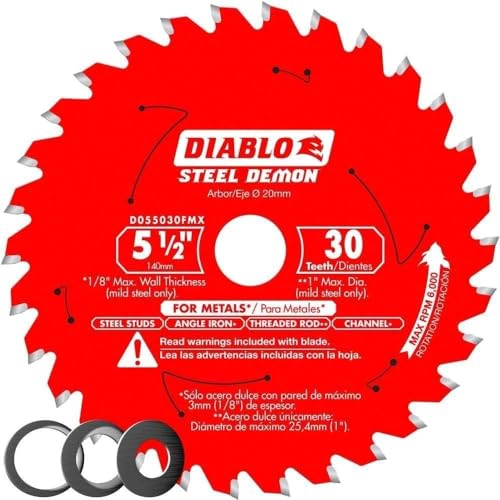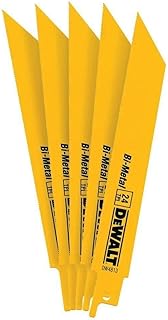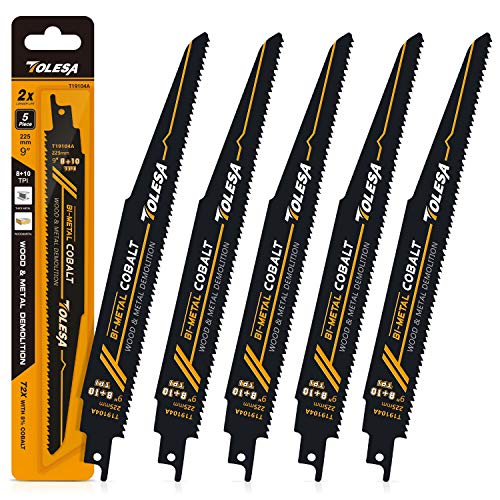Choosing the best sawzall blade for metal can be confusing with so many options available. The wrong blade wastes time, damages material, and burns through your budget. So, what’s the solution? You need to understand blade design, TPI, and how they perform with different metals.
But here’s the catch: not every sawzall blade is built the same. Some excel at cutting thin sheet metal, while others handle thick steel with ease. And if you’re exploring other projects, you might also want to check guides on the best sawzall blades for wood, the best saw to cut plywood, or even a roundup of the best saws for general use. Each tool has its purpose—your job is matching the right blade to the right material.
Ready to find the perfect blade for your needs? Let’s dive in.
Top Picks
Best Metal Cutting: 25 Pack 6 inch 14/18 TPI Diablo Steel Demon Bi-Metal
This 25 pack of 6 inch Diablo Steel Demon bi metal reciprocating saw blades is engineered for dismantling and medium metal cutting. With a 14 to 18 TPI tooth configuration, the blades are optimized for smooth and efficient cuts on materials from 1/16 to 5/16 inch thick. Made from alloy steel, they combine strength and flexibility to withstand demanding tasks. Their compact size makes them suitable for tight spaces, while the red finish enhances visibility.
Customers often highlight the consistent cutting performance and long blade life compared to standard options. Professionals appreciate the reliability when used in automotive dismantling and medium gauge metal work, though some note they are less effective for heavier duty steel applications.
Overall, these blades deliver strong value for those needing dependable performance in auto and metal cutting jobs. They balance durability and efficiency well, making them a practical choice for both professionals and serious DIY users.
Best Durability: 10 Pack 6 inch 14/18 TPI Bi-Metal Auto Dismantling Sawzall
This 10 pack of 6 inch 14/18 TPI bi metal reciprocating saw blades is designed for dismantling and cutting medium gauge metals. Each blade features a 0.04 inch thickness and interlocking sharp teeth for fast and straight cuts. With an added 8 percent cobalt in the tooth design, the blades provide extended durability and better performance under heavy use. The anti rust coating helps resist wear, while a retractable storage box keeps the set organized and portable.
Users report that the blades cut smoothly through pipes, angle steel, and conduits, making them reliable for both professionals and DIY projects. They also appreciate the universal compatibility with major Sawzall brands. However, some note that the 6 inch length can be limiting for larger demolition tasks and that using lubrication is necessary to maximize blade life.
Overall, this set offers solid efficiency and durability at a practical size, making it a dependable option for everyday metal cutting tasks.
Best for Thick Metal: EZARC Carbide Reciprocating Saw Blade R678HM Endurance
The EZARC Carbide Reciprocating Saw Blade R678HM is a 6 inch 8 TPI blade built for the toughest metal cutting jobs. Featuring individually welded carbide teeth, it offers exceptional impact strength and flexibility, making it suitable for heavy duty demolition and cutting advanced materials. The blade is designed to handle stainless steel, rebar, car beams, and other hardened or high alloy steels where traditional bi metal blades wear out quickly. With a universal 1/2 inch shank, it is compatible with all major reciprocating saw brands.
Professionals highlight the remarkable durability and cutting efficiency, often noting that the blades outlast standard bi metal options many times over. The performance on cast iron and thick metals is a standout, though some users mention the higher price and slower cutting on thin materials.
Overall, this 3 pack delivers premium performance and longevity for demanding applications. For users working with heavy metals and advanced alloys, it provides excellent value by significantly reducing blade changes and downtime.
FAQs
Is 18 or 24 TPI better for metal?
The answer depends on the thickness of the material. An 18 TPI (teeth per inch) blade works best for medium to thick metals because it balances cutting speed with durability. A 24 TPI blade, on the other hand, is ideal for thinner metals, such as sheet metal or conduit, since the finer teeth prevent snagging and deliver smoother cuts. If you use 24 TPI on thick steel, it may cut too slowly and wear out faster.
Is a sawzall good for cutting metal?
Yes, a sawzall is one of the most versatile tools for cutting metal. With the right blade, it can handle steel, aluminum, copper, cast iron, and even rebar. The tool’s back-and-forth motion makes it especially effective for demolition and construction work. Its main advantage is flexibility—you can cut metal pipes in tight spaces, slice through sheet metal, or even cut bolts flush with surfaces.
How thick of metal can a sawzall cut?
A sawzall can cut metal up to about ½ inch thick with standard bi-metal blades. For thicker steel, carbide-tipped blades are recommended because they can withstand more heat and abrasion. In practice, professionals have used sawzalls to cut steel beams and thick pipes, but blade selection is critical. Trying to cut very thick metal with a fine-tooth blade will overheat and ruin it quickly.
What is the best sawzall blade for cutting thick steel?
For thick steel, carbide-tipped blades are the top choice. They last significantly longer than standard bi-metal blades and are designed to withstand the stress of cutting dense materials. Look for blades with 8–14 TPI, which provide a balance between cutting speed and durability. Brands like Milwaukee Torch Carbide or Diablo Steel Demon are popular because they can cut through hardened steel, cast iron, and high-strength alloys with ease.
What TPI is best for thick metal?
For thick metal, a lower TPI—generally between 8 and 14—is recommended. The larger tooth spacing allows for faster cutting and better chip clearance, which prevents clogging and overheating. Higher TPI blades, such as 18 or 24, work best on thinner materials. If you’re consistently working with heavy-duty steel or rebar, a carbide-tipped 8 TPI blade is the most efficient choice.
Conclusion
Selecting the best sawzall blade for metal comes down to matching the blade to your project. Thin sheet metal calls for 24 TPI, while thick steel requires carbide-tipped blades with lower TPI for faster, cleaner cuts. A sawzall, when paired with the right blade, can cut through almost any metal thickness—from conduit to heavy beams—making it one of the most versatile tools in your workshop. By understanding TPI, material compatibility, and blade construction, you’ll ensure longer blade life, cleaner cuts, and better results every time.






















